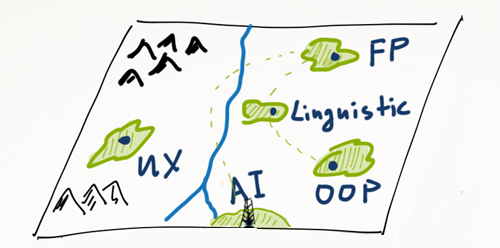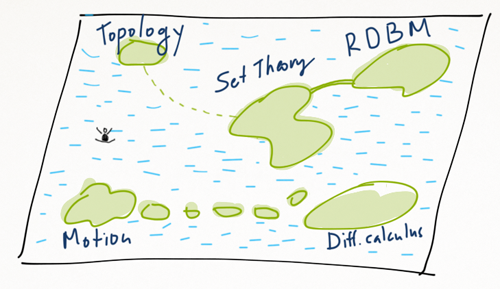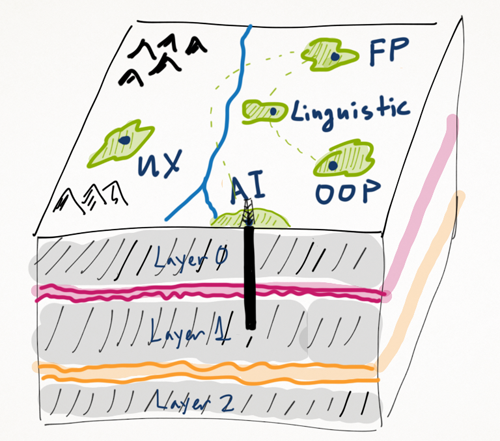How do we learn
I want to talk from three aspects of our knowledge: the breadth of the disciplines, the depth of knowledge of the disciplines and the relationship between the disciplines. I was born a good metaphor that brings them together. In general, I don’t really like metaphors, because they often lead in the wrong direction. But in this case, the metaphor seems to me very good.
It is believed that there are two types of people. Some like to learn a lot and superficially, others choose a couple of disciplines and study them very deeply. The former are usually called foxes, the latter are hedgehogs .
For me, learning is very similar to exploration. Imagine a new continent. You know nothing about him. Yes, you see mountains, forests, rivers, but you have no idea what is inside. You do not know what is beyond the horizon, is there any sea, how cold is it in the north and what is the temperature in the south.
')
You start by mapping. You send the expeditions in all directions and draw a map of the area. Then you begin to drill test wells and find out the composition of the soil. Then you find oil, gold, diamonds and start mining.

Training exactly fits this scenario. You study math, for example. At first, you know little about it. Well, you count to 10 and distinguish three red balls from five blue ones. Gradually, you discover new territories. You learn the multiplication table, you will be surprised to learn about the existence of real numbers and the impossibility of dividing by zero. You touch the differential calculus and for some reason you learn to take integrals. Years to 16 you have a map of the nearest territories on your hands, but you most likely have not heard anything about set theory, topology and functional analysis. Yes, and you hardly achieved any special indentation in any branch of mathematics. So, we picked the sand from above.
The school does not give any deep knowledge. You are just making a map to start drilling test wells.
The choice of direction for someone is difficult, for someone not. One way or another, you find yourself at the university. Professors rightly believe that you do not know a damn. But most educators don't care where you start drilling. They are sad (or interesting) to read their lectures, and very few people are worried about the links of disciplines. Here, physicists take and immediately use differential calculus to solve problems, and what they taught you on mat analysis is of very little interest. Every item on your map is an island . And for some reason it is believed that it is your task to build bridges between the islands, or at least set up ferries between them.
On your maps there are huge white spots of the seas and oceans, in which you don’t particularly begin drilling, except in the shelf zone.

Sometimes, some areas for you are connected almost together, and an archipelago rises instead of a bridge. At this point, you establish connections between disciplines. Gradually, the connection becomes obvious and stable, instead of the archipelago grows land, on which you pave a high-speed highway. For example, you clearly understand what a derivative is and how it can be applied in mechanics. And bang - you have a clear connection between the movement of bodies and differential calculus.
Why is the differential calculus given separately in the school program ? Why is it never mentioned how to put it into practice?
Modern education, at least in our country, helps you discover and master new islands, but hardly helps you discover and master continents. Relationship is given very little attention. Stories and the logic of discovery are also given little attention. This is bad.
So back to the knowledge in breadth vs. knowledge in depth. If you start to master a new area, first it is better to make a map, that is, to gain broad knowledge. This is the only way you can get into the topic and find the places where you need to drill.
For example, you study programming. It's pretty silly to immediately rush into the deep theory of artificial intelligence or lambda numbering. It is also foolish to rush into the deep study of any language. First you need to know the history of the industry, how everything developed, what directions there are, what they are for and what they do. What are the paradigms, types of languages, platforms, links between them, development prospects. If you try to build a “software development” map of the continent, it will be much easier for you to understand where to start. You are interested in web development, welcome to the world of javascript, functional programming, scripting languages and markup languages. You are interested in gamedev, take care of AI, languages with strong typing and algorithms. Of course, this does not mean that you should ignore everything else, but you have clear places where you need to drill deep.
First you have to be a fox, and then turn into a hedgehog . The problem is that in the modern world it is much easier to remain a fox forever than to become a hedgehog . I myself feel that it has become much more difficult to study the chosen area in depth. You always want to read this one more blog post, check twitter, get distracted by an interesting article or book. In a world where the information is at your fingertips, there are huge temptations to be a fox.
Point selected and drilled sharpened. How to drill? On the way there are interesting layers and horizons. If you reach these layers, you will never roll back. And between the layers, the well may collapse. You delve into the topic, read the material, do something, and at some point things fall into place. Congratulations! You found gold.

In one book I read a good analogy. First you are in a dark room and study the subjects by touch. And at some point the light turns on and it becomes very clear where everything is standing. The same thing happens in your head. Suddenly the lights come on and all the separate concepts line up in a clear picture. This moment cannot be forgotten and this clear picture will never be erased. The light will be on all the time. Perhaps the light will fade with time, but will not go out.
Sometimes it is very difficult to continue drilling. When you see that nothing changes, that you chase a topic for several months without significant progress, you want to throw everything to hell and leave for warm countries. What to do in this case? The only answer is to continue . If you quit once, then quit another time - you will simply lose confidence in your abilities. You will think that you are incapable of anything and you will be stuck at the current level forever. Need to continue drilling. We need to get to the first layer and experience a-ha! -Moment . You need to turn on the light and see the objects in the room.
What is the difference between excellent programmers and average programmers? Perhaps only because excellent programmers have always believed that they can become excellent, and the average never believed in it and stopped drilling. Belief in your own strength can work wonders.
Another question is if you do not particularly like drilling at a selected point. Most likely, you need to do something else. If studying a topic does not bring satisfaction at all, and opening a new book, you immediately check how many pages there are - the chosen topic is not for you. Walk on your map and find another place. You may be interested in UX, or automation, or marketing. A couple of test wells - and it will become clear to you where you can try to make an effort.
So how do we learn? What should be done for a more efficient process?
The task of a good teacher is to show the students their map , explain the path and sequence of the topic, show the hidden connections between the disciplines. With such a card in hand, the student will never get lost.
I have not met on my way a single teacher who would do it. I have to wade through the jungle on my own, with a machete and a torch, mapping new territories. I hope my children are more lucky.
It is believed that there are two types of people. Some like to learn a lot and superficially, others choose a couple of disciplines and study them very deeply. The former are usually called foxes, the latter are hedgehogs .
For me, learning is very similar to exploration. Imagine a new continent. You know nothing about him. Yes, you see mountains, forests, rivers, but you have no idea what is inside. You do not know what is beyond the horizon, is there any sea, how cold is it in the north and what is the temperature in the south.
')
Map
You start by mapping. You send the expeditions in all directions and draw a map of the area. Then you begin to drill test wells and find out the composition of the soil. Then you find oil, gold, diamonds and start mining.

Training exactly fits this scenario. You study math, for example. At first, you know little about it. Well, you count to 10 and distinguish three red balls from five blue ones. Gradually, you discover new territories. You learn the multiplication table, you will be surprised to learn about the existence of real numbers and the impossibility of dividing by zero. You touch the differential calculus and for some reason you learn to take integrals. Years to 16 you have a map of the nearest territories on your hands, but you most likely have not heard anything about set theory, topology and functional analysis. Yes, and you hardly achieved any special indentation in any branch of mathematics. So, we picked the sand from above.
The school does not give any deep knowledge. You are just making a map to start drilling test wells.
Connections
The choice of direction for someone is difficult, for someone not. One way or another, you find yourself at the university. Professors rightly believe that you do not know a damn. But most educators don't care where you start drilling. They are sad (or interesting) to read their lectures, and very few people are worried about the links of disciplines. Here, physicists take and immediately use differential calculus to solve problems, and what they taught you on mat analysis is of very little interest. Every item on your map is an island . And for some reason it is believed that it is your task to build bridges between the islands, or at least set up ferries between them.
On your maps there are huge white spots of the seas and oceans, in which you don’t particularly begin drilling, except in the shelf zone.

Sometimes, some areas for you are connected almost together, and an archipelago rises instead of a bridge. At this point, you establish connections between disciplines. Gradually, the connection becomes obvious and stable, instead of the archipelago grows land, on which you pave a high-speed highway. For example, you clearly understand what a derivative is and how it can be applied in mechanics. And bang - you have a clear connection between the movement of bodies and differential calculus.
Why is the differential calculus given separately in the school program ? Why is it never mentioned how to put it into practice?
Modern education, at least in our country, helps you discover and master new islands, but hardly helps you discover and master continents. Relationship is given very little attention. Stories and the logic of discovery are also given little attention. This is bad.
Foxes and Jerzy
So back to the knowledge in breadth vs. knowledge in depth. If you start to master a new area, first it is better to make a map, that is, to gain broad knowledge. This is the only way you can get into the topic and find the places where you need to drill.
For example, you study programming. It's pretty silly to immediately rush into the deep theory of artificial intelligence or lambda numbering. It is also foolish to rush into the deep study of any language. First you need to know the history of the industry, how everything developed, what directions there are, what they are for and what they do. What are the paradigms, types of languages, platforms, links between them, development prospects. If you try to build a “software development” map of the continent, it will be much easier for you to understand where to start. You are interested in web development, welcome to the world of javascript, functional programming, scripting languages and markup languages. You are interested in gamedev, take care of AI, languages with strong typing and algorithms. Of course, this does not mean that you should ignore everything else, but you have clear places where you need to drill deep.
First you have to be a fox, and then turn into a hedgehog . The problem is that in the modern world it is much easier to remain a fox forever than to become a hedgehog . I myself feel that it has become much more difficult to study the chosen area in depth. You always want to read this one more blog post, check twitter, get distracted by an interesting article or book. In a world where the information is at your fingertips, there are huge temptations to be a fox.
Deep drilling
Point selected and drilled sharpened. How to drill? On the way there are interesting layers and horizons. If you reach these layers, you will never roll back. And between the layers, the well may collapse. You delve into the topic, read the material, do something, and at some point things fall into place. Congratulations! You found gold.

In one book I read a good analogy. First you are in a dark room and study the subjects by touch. And at some point the light turns on and it becomes very clear where everything is standing. The same thing happens in your head. Suddenly the lights come on and all the separate concepts line up in a clear picture. This moment cannot be forgotten and this clear picture will never be erased. The light will be on all the time. Perhaps the light will fade with time, but will not go out.
Sometimes it is very difficult to continue drilling. When you see that nothing changes, that you chase a topic for several months without significant progress, you want to throw everything to hell and leave for warm countries. What to do in this case? The only answer is to continue . If you quit once, then quit another time - you will simply lose confidence in your abilities. You will think that you are incapable of anything and you will be stuck at the current level forever. Need to continue drilling. We need to get to the first layer and experience a-ha! -Moment . You need to turn on the light and see the objects in the room.
What is the difference between excellent programmers and average programmers? Perhaps only because excellent programmers have always believed that they can become excellent, and the average never believed in it and stopped drilling. Belief in your own strength can work wonders.
Another question is if you do not particularly like drilling at a selected point. Most likely, you need to do something else. If studying a topic does not bring satisfaction at all, and opening a new book, you immediately check how many pages there are - the chosen topic is not for you. Walk on your map and find another place. You may be interested in UX, or automation, or marketing. A couple of test wells - and it will become clear to you where you can try to make an effort.
Summary
So how do we learn? What should be done for a more efficient process?
- Enable fox mode and map the territory. Outline a few places from which to start the deepening of the topic.
- Try to understand the links between disciplines and the sequence of their development. At a high level, this is quite simple.
- Turn on the hedgehog mode and start working on the topic deeply. Sometimes you have to be interrupted and switch to related topics, otherwise deeper layers are unattainable.
The task of a good teacher is to show the students their map , explain the path and sequence of the topic, show the hidden connections between the disciplines. With such a card in hand, the student will never get lost.
I have not met on my way a single teacher who would do it. I have to wade through the jungle on my own, with a machete and a torch, mapping new territories. I hope my children are more lucky.
Source: https://habr.com/ru/post/135657/
All Articles